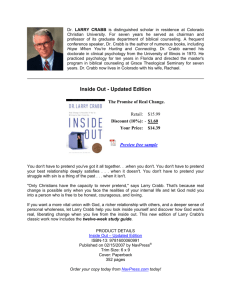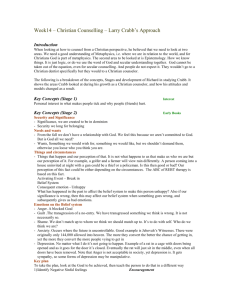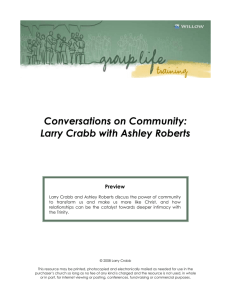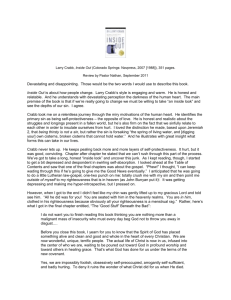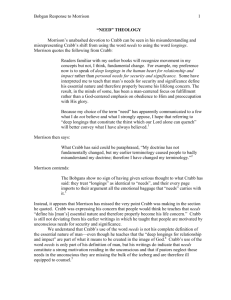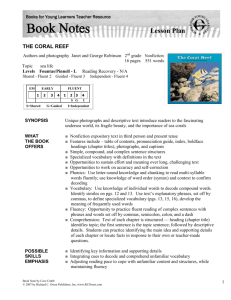Safest Place on Earth & Connecting by Larry Crabb
advertisement
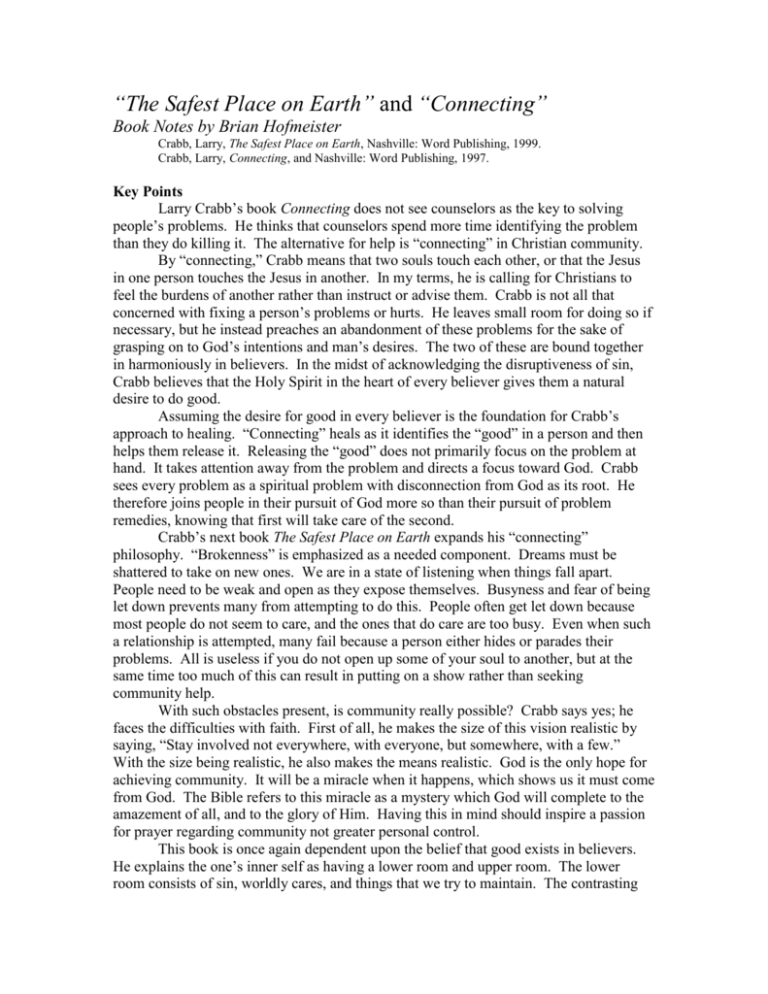
“The Safest Place on Earth” and “Connecting” Book Notes by Brian Hofmeister Crabb, Larry, The Safest Place on Earth, Nashville: Word Publishing, 1999. Crabb, Larry, Connecting, and Nashville: Word Publishing, 1997. Key Points Larry Crabb’s book Connecting does not see counselors as the key to solving people’s problems. He thinks that counselors spend more time identifying the problem than they do killing it. The alternative for help is “connecting” in Christian community. By “connecting,” Crabb means that two souls touch each other, or that the Jesus in one person touches the Jesus in another. In my terms, he is calling for Christians to feel the burdens of another rather than instruct or advise them. Crabb is not all that concerned with fixing a person’s problems or hurts. He leaves small room for doing so if necessary, but he instead preaches an abandonment of these problems for the sake of grasping on to God’s intentions and man’s desires. The two of these are bound together in harmoniously in believers. In the midst of acknowledging the disruptiveness of sin, Crabb believes that the Holy Spirit in the heart of every believer gives them a natural desire to do good. Assuming the desire for good in every believer is the foundation for Crabb’s approach to healing. “Connecting” heals as it identifies the “good” in a person and then helps them release it. Releasing the “good” does not primarily focus on the problem at hand. It takes attention away from the problem and directs a focus toward God. Crabb sees every problem as a spiritual problem with disconnection from God as its root. He therefore joins people in their pursuit of God more so than their pursuit of problem remedies, knowing that first will take care of the second. Crabb’s next book The Safest Place on Earth expands his “connecting” philosophy. “Brokenness” is emphasized as a needed component. Dreams must be shattered to take on new ones. We are in a state of listening when things fall apart. People need to be weak and open as they expose themselves. Busyness and fear of being let down prevents many from attempting to do this. People often get let down because most people do not seem to care, and the ones that do care are too busy. Even when such a relationship is attempted, many fail because a person either hides or parades their problems. All is useless if you do not open up some of your soul to another, but at the same time too much of this can result in putting on a show rather than seeking community help. With such obstacles present, is community really possible? Crabb says yes; he faces the difficulties with faith. First of all, he makes the size of this vision realistic by saying, “Stay involved not everywhere, with everyone, but somewhere, with a few.” With the size being realistic, he also makes the means realistic. God is the only hope for achieving community. It will be a miracle when it happens, which shows us it must come from God. The Bible refers to this miracle as a mystery which God will complete to the amazement of all, and to the glory of Him. Having this in mind should inspire a passion for prayer regarding community not greater personal control. This book is once again dependent upon the belief that good exists in believers. He explains the one’s inner self as having a lower room and upper room. The lower room consists of sin, worldly cares, and things that we try to maintain. The contrasting 2 upper room is a place of purity, rest, and abiding in God. The community of believers should show other believers that they have this upper room and subsequently should move to there as the dominant place from which they live Contribution to Counseling Crabb’s views on community make counseling realistic for those with minimal training. The average person can excel in his system. All that is need is a concerned heart, and attentiveness to the Spirit. His words go so far as to discourage people from seeking professional training in counseling. This could ultimately be very encouraging to the pastoral counselor who questions his or her abilities. Another refreshing aspect of Crabb’s approach is that he does not propose a “how to” process. Many breakthroughs in ministry are attempted by implementing a plan, strategy, or process. The solutions are often presented in such a way that one may wonder if they really need God for success. Crabb on the other hand expresses complete dependence upon God. Even when expressing practical steps that can be taken, he is sure to expose that community is a miracle in God’s hands. Seeking God’s guidance in connecting with people is the heart of his proposition. Emphasizing dependence on God relieves pastoral counselor from a load they cannot bear. Besides relieving pastoral counselors with depending on God, Crabb also relieves them by mobilizing laity. Interaction of lay members is the only way for connecting. This is a nice relief from weighty responsibility when laity minister to themselves, yet is also helpful for the character of the pastoral counselor. The pastoral counselor learns humility as the congregation heals itself without need for his or her “expert” contribution. Besides encouraging those who are minimally trained, his thoughts complement the superior resources of the professionals. He encourages the professionals to see human need for connecting, not just problem solving. A more sympathetic and sincere approach to counseling sessions may result. Although I affirm much of Crabb’s outlooks, I would cast applications thereof into a different mold. His application seems a disproportionately “feely.” I got the impression from my reading that Crabb is so fed up with know-it-all solutions that he has gone to an inappropriate extreme of just feeling along with other people’s feeling. Chapter 15 of Connecting seemed uncharacteristic of the rest of the book, yet a step in the right direction. This chapter encourages a doctor like approach to struggling believers. This involves tough questions and serious urgency. In other words, we open up a person’s problem and work towards healing it even if they don’t really like it. This strong, upfront, and sincere love is often needed. We cannot always wait for and “open door” before addressing a problem. “Connecting” with a person's feelings does not help when superficial lies are all that is shared. I think it is appropriate to knock down a friends wall if they do not “open a door” for you when dealing with serious spiritual matters. Wounds of a friend can be trusted. Crabb touches on this aspect of love only briefly. I believe he has underemphasized confrontation and overemphasized sharing feelings. Both are needed, yet I do not agree with how he proportions the two.
